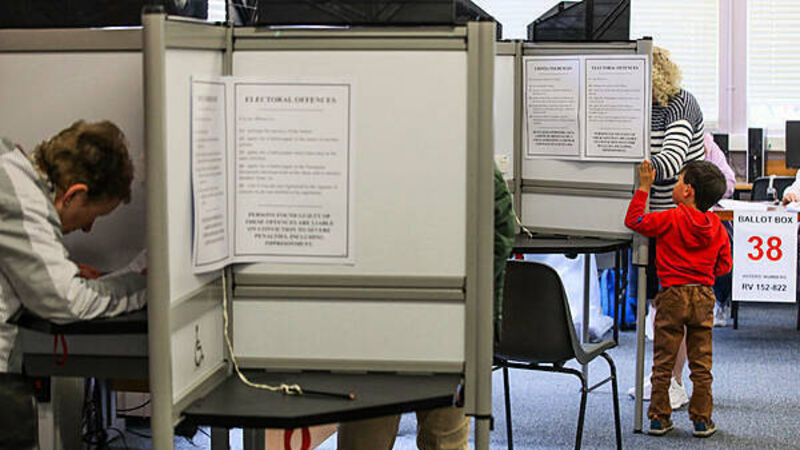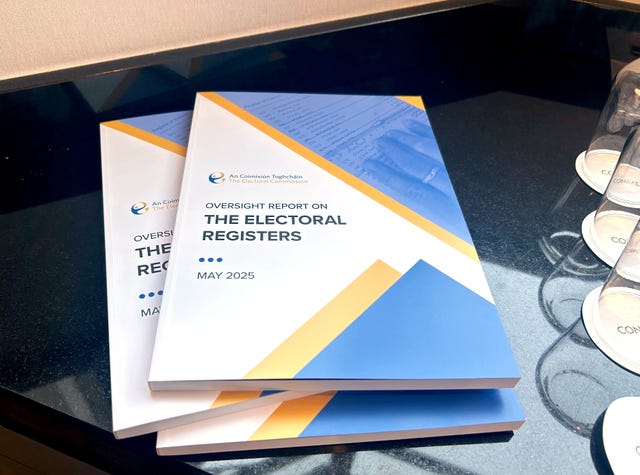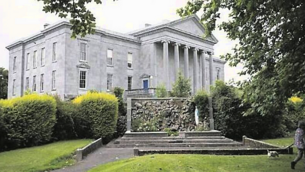Hundreds of thousands of inaccurate entries on electoral register, report finds

By Cillian Sherlock, PA
There are hundreds of thousands of inaccurate entries on the electoral register, the commission tasked with overseeing elections has estimated.
An Coimisiún Toghcháin, or the Electoral Commission, said it is “deeply concerned” about legacy accuracy issues in electoral registers maintained by local authorities across the country.
The commission said it is “simply not possible” at present to determine exactly how many names are on these registers when they should not be, but its chief executive said it is “safe to say” that the lists contain hundreds of thousands of inaccurate entries made up of duplicates, dead people and people who have emigrated.
It means that it is also not possible to give accurate estimates on the completeness of electoral registers, which is the percentage of a given population that has actually registered to vote in any local authority.
The first report on Ireland’s Electoral Registers is published today by @ElecCommIRL
This report assesses the current status of the accuracy and completeness of the registers and how they are managed by Ireland’s 31 local authorities.https://t.co/zkLCAlOcGs pic.twitter.com/WgAs5P61NG— An Coimisiún Toghcháin, The Electoral Commission (@ElecCommIRL) May 1, 2025
This issue goes back decades, with people registered more than once in one or more local authority areas, people who have emigrated and people who have died remaining on the registers.
But Art O’Leary, the chief executive of the commission, said there was “no evidence to suggest” that election integrity had been challenged by the discrepancies.
There were 11 local authorities with registration rates that were more than 100 per cent of the eligible population based on 2024 Central Statistics Office data, indicating widespread inaccuracies.
The worst local authorities by this metric included Sligo, Donegal, Leitrim, Longford and Monaghan.
Reporters were told that the process of removing a suspected redundant or duplicate name from the register could be lengthy, but that workers in local authorities used a variety of indicators to identify such issues.
This included viewing posts on RIP.ie and listening to local radio death notice services.
The commission’s lengthy report comes after the “busiest year in the history of the State” for elections experienced in 2024, and examines an issue which the body said was “much more complex” than first anticipated.
At a briefing on Thursday, reporters were also told there were discrepancies across local authorities regarding dedicated funding and resourcing towards maintaining accurate registers.
The commission found that a move away from a system which allowed for “third-party registrations” to individual responsibilities following the Electoral Reform Act had resulted in legacy issues around duplication of entries.
There are 31 individual registers for voters across the country and only four – the ones associated with Dublin – allow for cross-reference.

The Department of Housing is running a scheme – the Local Government Electoral Registration System (LGERS) project – to develop a centralised register for the purpose of analysis.
The project is expected to be significantly advanced by next year.
But the commission’s head of electoral operations said LGERS “is not going to solve” accuracy issues alone and added: “There is another body of work required.”
Tim Carey, head of electoral operations at the commission, said that the organisation did not know the full extent of the inaccuracies in the register.
Mr Carey said that this was because there was a risk of individual data gaps or discrepancies between the registers maintained by separate local authorities being migrated into the central database.
He said this “dark matter” on the electoral registers also meant that it was impossible to give estimates of turnout in elections in some local authorities.

He added that there would continue to be accuracy issues in registers until resourcing of franchise teams in local authorities was addressed.
Mr Carey said there was “no plan” in some local authorities to manage these issues.
He said there was “no magic wand” nor “fairy dust” to fix the issues with registers, adding that it required funding for professional, dedicated staffing.
While there would be a presidential election towards the end of this year, the commission said it was hopeful that the electoral register would be much more accurate by the next expected wave of electoral events in 2029.
Mr O’Leary said “the future is bright” for creating a more accurate register for later elections.
The report’s key recommendations set out the need for accuracy audits of each register, a national awareness campaign focused on accurate voter registration, the setting of standards for accuracy, the increase of resources for local authority electoral register functions and increased prioritisation of the registers and multi-annual plans in local authorities.









